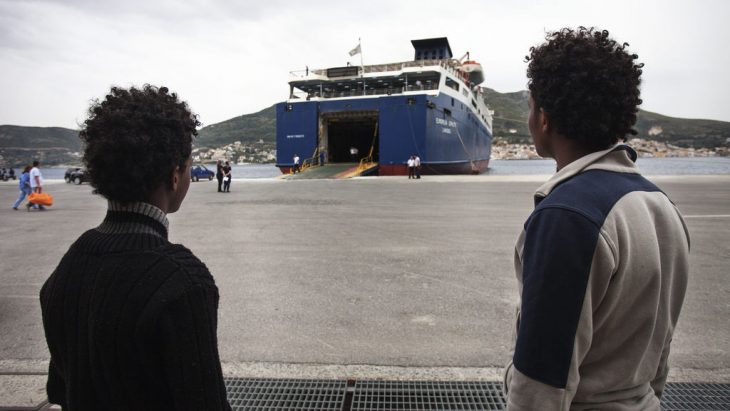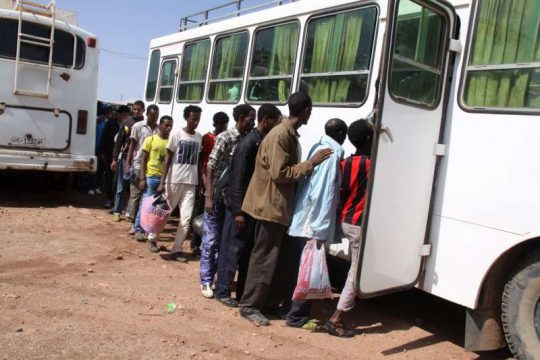OXFORD, 10 June 2015 (IRIN) - Several nations recently toughened their stance on asylum requests from Eritrea after a Danish report suggested those leaving the country do so largely for economic reasons. The results of a year-long UN inquiry into human rights in Eritrea now indicate this could have been a big mistake.
Eritreans make up the second largest national group of asylum-seekers risking their lives to cross the Mediterranean after Syrians. Almost 11,000 have arrived in Italy so far this year, and in 2014 nearly 37,000 applied for asylum in the European Union.
The vast majority (about 90 percent) have been granted some form of international protection, but in recent months, several member states, including the UK, Denmark and Norway, have changed their position, on the back of the controversial Danish report.
In contrast, the UN Commission of Inquiry on human rights in Eritrea found evidence of a totalitarian state responsible for “systemic, widespread and gross human rights violations” that include extrajudicial executions, torture, arbitrary detention, enforced disappearances and a system of indefinite national service that amounts to forced labour.
“Faced with a seemingly hopeless situation they feel powerless to change, hundreds of thousands of Eritreans are fleeing their country,” says the report, which is based on interviews with 550 Eritrean refugees in eight countries as well as 160 written submissions.
severe human rights violations
Eritreans are fleeing severe human rights violations in their country and are in need of international protection.
“To ascribe their decision to leave solely to economic reasons is to ignore the dire situation of human rights in Eritrea and the very real suffering of its people. Eritreans are fleeing severe human rights violations in their country and are in need of international protection.”
Eritrea said the Commission of Inquiry's findings were "totally unfounded and devoid of all merit".
But activists have welcomed the commission’s findings, particularly its recommendation that the international community continue providing protection to those fleeing Eritrea.
“I believe this is a very important development for the protection of Eritrean refugees,” Daniel Mekonnen, a human rights lawyer and former judge from Eritrea, now living in Switzerland, told IRIN. “I don’t think European countries will find it easy to refuse protection to Eritreans when the UN is explicitly recommending they provide protection.
"These are not economic migrants as some European countries are trying to say,” he told IRIN. “They’re fleeing persecution and trying to escape one of the most ruthless dictatorships in the world.”
In November 2014, the Danish Immigration Service released a report on Eritrea to be used as guidance for determining refugee claims. The report, which Human Rights Watch (HRW) described as “deeply flawed,” cited anonymous Western diplomats and an unnamed UN agency stating that Eritreans were leaving the country for economic rather than political reasons and that “there is no general climate of fear.”
"stem migration"
HRW’s deputy director Leslie Lefkow alleged that the report was “a political effort to stem migration” rather than an honest assessment of Eritrea’s human rights situation.
The Immigration Service later backtracked on parts of the report and two officials resigned over its contents. But this did not stop the UK Home Office from citing the Danish report extensively in its latest country guidance for Eritrea, released in March.
Many young Eritreans list indefinite conscription into the national service as a major factor in their decision to flee the country. The Home Office quoted assurances from Eritrea’s foreign minister that national service would now last for a maximum of 18 months.
The UK guidance also relied on findings by the Danish Immigration Service that national service evaders and deserters were not seriously punished, and that those who left the country illegally were not at risk on their return providing they signed “a letter of apology” at the Eritrean embassy and paid a tax for living abroad.
Refusal rate for Eritreans
Since the UK issued its new guidance, the refusal rate for asylum applications from Eritreans has nearly doubled, from 13 percent in 2014 to 23 percent in the first quarter of 2015, based on Home Office figures.
The UN report contradicts any suggestion that the terms or conditions of national service have changed. “Conscripts end up serving for an indefinite period, often for years in harsh and inhumane conditions,” it says, adding that those who leave the country illegally to avoid national service only to be forcibly returned “have been arrested, detained and subjected to ill-treatment and torture.”
Mekonnen, who was part of a taskforce that collected 80 written submissions for the Inquiry from the Eritrean diaspora, confirmed that reports of human rights violations continue to come in.
“It’s not true that things have changed,” he told IRIN. “The government has been saying since 2001 [that they would start limiting national service]. Why should we take this seriously now?”
Responding to a question from IRIN about whether the UK Home Office intends to revise its country guidance for Eritrea, a spokesperson said: “We will carefully consider the findings of the United Nations report.”
ks/ag






